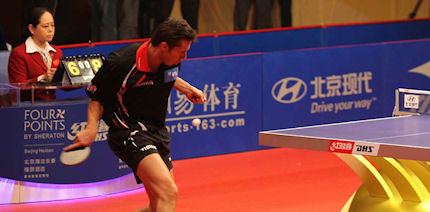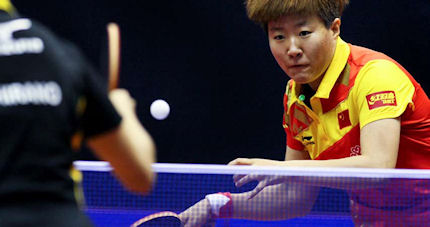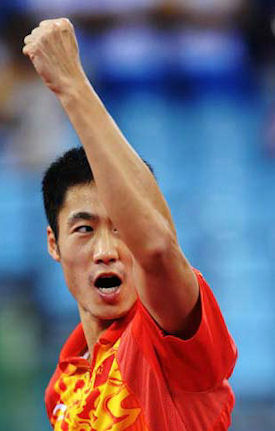This article first appeared in the Nov/Dec 2011 issue of World Gaming magazine.
In China table tennis is more than just a sport. Since Chairman Mao decreed it to be the national game it has defined a country. Now, China must overcome rule changes to maintain its dominance at the London Olympics.

Following China’s gold medal clean sweep at the Beijing Olympics, the International Table Tennis Federation (ITTF) chose to reduce the amount of singles qualifying spots for the London Olympics from three to two per country. The International Olympic committee have a history of trying to level the playing field and promote more widespread international participation, which has no doubt prompted this move. However, the result is crippling for the Chinese table tennis team, given the proliferation of Chinese athletes at the top of the world rankings.
An estimated 300 million participants make table tennis China’s most popular recreational sport. It was not brought to Chinese shores by those crazy 18th century French aristocrats, but by western immigrants at the turn of the 20th century. The game proved an instant hit. Natural ability and a fierce dedication to training would eventually see China dominate “ping pong”, as it is called in Chinese, on a global scale.
China first entered the World Table Tennis Championships in 1953. Six years later in Dortmund, Germany, Rong Guotuan became the first athlete representing the People’s Republic of China to win a World Championship title in any sport. With Rong’s famous victory came wider recognition for China, inspiring the government to pour extensive funding into training a new breed of champions.
Dedication and innovation are two words often used when describing the Chinese table tennis system. Zhuang Zedong claimed the 1961 men’s world singles title following a gruelling training regimen. He successfully defended his crown at the next two championships. China’s reputation as table tennis innovators was further cemented in the early 1960s with the groundbreaking use of combination bats (with different types of rubber on each side) during competition.
1965 to 1971 was a period of cultural transition for China, with no teams sent to international competitions during this time. However, the Chinese love affair with the sport never diminished.

1981 was the year the Chinese asserted complete domination of the sport, which continues to this day. Chinese athletes won all seven gold medals at the 1981 World Championships in Yugoslavia. In 1995 Chinese competitors completed the clean sweep again by taking all seven gold medals at the World Championships, this time held in Tianjin in China.
The Chinese team has repeated this feat time and again, with gold medal clean sweeps at the World Championships in Japan in 2001, China in 2005 and Croatia in 2007. The 2008 Beijing Olympic Games marked China’s most significant achievement yet with the hosts claiming all the gold medals on offer. Heroes of the nation were crowned in front of adoring home audiences, whilst the world watched on.
The Chinese took all before them at the 2009 World Championships in Yokohama. And at the worlds in Rotterdam last May, China again demonstrated their supreme dominance in the sport by sweeping all gold medals, even claiming all four of the women’s singles semifinal spots!
Two youngsters from the star-studded Chinese team, 23-year-old Zhang Jike and 21-year-old Ding Ning, beat their more credentialed teammates to be crowned world champions in Rotterdam. These two superstars of the sport represent the new breed of China’s table tennis elite, but Ding Ning will not fly the flag for China in the London 2012 Olympic Games singles competition.
The sport’s governing body the ITTF announced in June that the top 28 players in the world singles rankings would qualify for the 2012 Summer Games. However, no more than two players from any one delegation could qualify for singles competition, down on three per nation at previous Olympics. This essentially makes a mockery of both the world rankings and the world championship results. The decision might be good news for lowerranked players from everywhere else in the world, but there will be numerous talented Chinese players smarting at the initiative.
With four of the world’s five top-ranked male singles players from China, this ruling is an obvious setback for the Chinese game, and appears specifically designed to dilute its dominance. The changes reduce China’s numerical strength, but Chinese athletes will still dominate the betting in both the men’s and women’s singles events.
Wang Hao and Zhang Jike will play in the men’s singles Olympic event in London, nominated in accordance with the first registration deadline set by the ITTF. Similarly, front-runners in world rankings Li Xiaoxia and Guo Yan will compete in the women’s competition.

Guo Yan
China can qualify one extra athlete per gender through the World Team Championships in Dortmund, Germany, to be held from 25 March to 1 April next year. But due to the strict two-player cap on singles competition, these extra vacancies only exist in the team events. This leaves one final Olympic berth open to remaining forces like male player Ma Long, and newly crowned female singles world champion Ding Ning. Despite her recent achievement, she hasn’t performed as consistently as Li Xiaoxia and Guo Yan, who remain ahead of her in the world rankings. So Ding Ning will join the large group of Chinese athletes competing for this coveted third team spot.
Ma Lin and Wang Liqin, veterans from the Beijing Olympics winning squad, are amongst the competition for the final place on the team.

Wang Liqin
“One good thing is that I’m not totally ruled out,” said Ma Lin, the 2008 Olympic men’s singles gold medallist, last June having missed the first batch of Olympic qualifications.
The 31-year-old admitted that age might be his greatest hindrance in the pursuit of a third Olympics.
“Now I need a strong stimulus to mobilize myself since I am older,” said the two-time Olympian. “I find motivation from fierce competition. I have been through such a competitive atmosphere since I battled for Olympic qualification in 2000.”
Former world number one Wang Liqin also refused to concede his spot in the London Games, despite being dropped from China’s national squad for last year’s Asian Games.
“I will absolutely not give up…I have always told myself to work harder. Although I know it’s going to be tough, I will try my best,” said Wang, men’s singles world champion in 2001, 2005 and 2007.
The new Olympic qualification guidelines may have prematurely disrupted preparations for the London Games, but the Chinese team will be ready to fire when it matters most. Competition is always healthy, and whoever wins the honour of representing this proud table tennis nation in the team’s events will prove a fierce opponent. As vice-chairman of the Chinese Table Tennis Association Liu Fengyan said, “anything can happen”. But Mr Liu knows that anything other than gold in all disciplines for China will be considered a failure.
Did you know?
|







